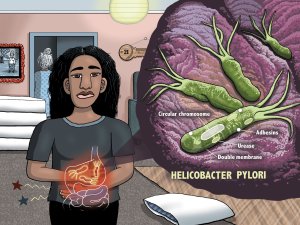Academic pharmacist Nataly Martini provides key information on Helicobacter pylori pathophysiology, diagnosis and evidence-based treatment strategies to enhance patient outcomes
Seven measles cases now confirmed in Canterbury
Seven measles cases now confirmed in Canterbury

Two further cases of measles have been identified in Canterbury bringing the total of confirmed cases to seven. The two new cases are a preschool-age child and a woman in her 40s.
Measles is a serious, highly infectious, potentially life-threatening disease and Medical Officer of Health Dr Pink advises that people are infectious from five days before the onset of the rash until five days after the rash appears. “People should stay in isolation from the time that they may have become infected until five days after the rash first appears.”
“This means staying home from school or work and having no contact with unimmunised people. If others in your household are unimmunised, they need to stay in isolation too for fourteen days from their likely first exposure.
“Because measles is so infectious, it’s important people with symptoms don’t visit their GP or after hours clinics but phone their family doctor/general practice team for advice instead, to avoid infecting other people. People should only go to the hospital if it’s an emergency and should inform staff immediately if they think they have measles.”
Anyone with measles symptoms or who believes they may have been exposed, should contact their usual general practice team 24/7 for additional advice. Calls made after hours will be answered by a nurse who will advise you what to do and where to go if you need to be seen.
“If you have had two MMR vaccinations or were born before 1969, you are considered immune to measles. Everyone else may be vulnerable to infection,” Dr Pink says.
Those born overseas or who are unsure which vaccinations they might have had, should contact their general practice team for advice. The measles vaccine and the appointment to have it is free to all those who are eligible for funded healthcare in New Zealand.
“As the numbers of confirmed cases climb, the risk of getting measles increases for those not immunised,” Dr Pink says.
More information about measles is available at https://www.health.govt.nz/your-health/conditions-and-treatments/diseases-and-illnesses/measles and http://www.immune.org.nz/hot-topic/measles-overseas-and-new-zealand.
Measles Fact Sheet
- Measles is a highly infectious viral illness spread by contact with respiratory secretions through coughing and sneezing
- Symptoms of measles include:
- A respiratory type of illness with dry cough, runny nose, headache
- Temperature over 38.5 C and feeling very unwell
- A red blotchy rash starts on day 4-5 of the illness usually on the face and moves to the chest and arms.
- People are infectious from five days before the onset of the rash to five days after the rash starts.
- Infected persons should stay in isolation – staying home from school or work - during this time.
- The best protection from measles is to have two MMR vaccinations. MMR is available from your family practice and is free to eligible persons.
- People are considered immune if they have received two doses of MMR vaccine, have had a measles illness previously, or were born before 1969.
- Anyone believing they have been exposed to measles or exhibiting symptoms, should not go to the ED or after hours’ clinic or general practitioner. Instead call your GP any time, 24/7 for free health advice.




